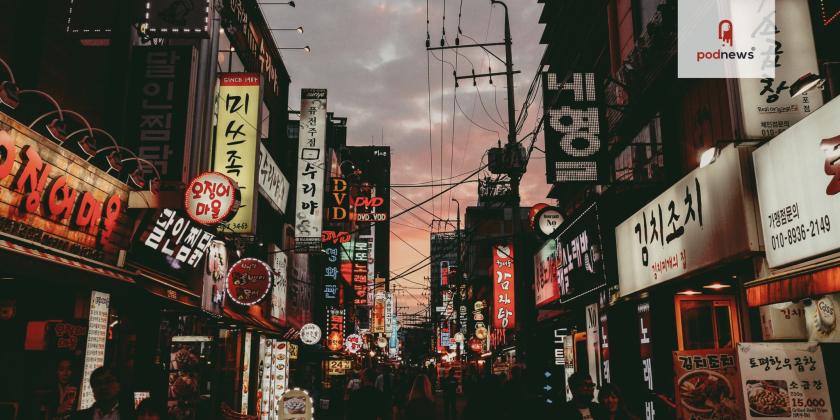
Korea: a podcasting deep-dive
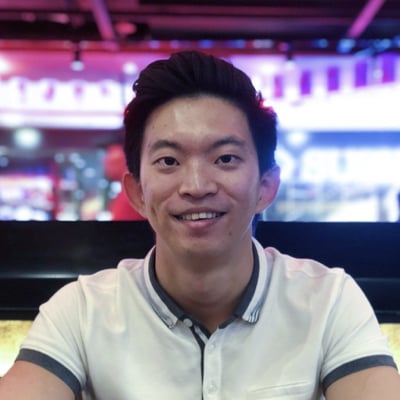
This article is at least a year old
In the second of our deep-dives into different East and South East Asian podcast markets, we go to South Korea: a place you may have thought has some of the highest podcast consumption in the world - but it’s not all as it seems…
What drives podcasting?
Before we can even discuss JKAPAC’s deep-dive, we need to understand what drives the podcasting ecosystem.
Typically podcasts have one of, if not the, lowest barrier of entry to creating an “acceptable” audience product. This means that usually it is a creator driven platform - in the sense that you find more willingness for someone to create. But unlike Tiktok or Youtube where it is metric driven (“think Beastification of Youtube”) - most podcasters create because they are inspired.
As such the question we need to answer for podcast content is: “After watching the content, is there a reason for the listener to become a podcast creator?”. Usually there’s 3 aspects to this:
- Does the content have podcast superiority? Or put in another way - does removing visuals enhance the value of the production?
- Does the content capture the locality, trends and influences of the time?
- Are there local barriers that prevent one from being a content creator? Is the topic easy to reproduce?
The more often the answer is “Yes!” the more likely content is provided organically into the ecosystem, which eventually creates a category that drives podcast adoption. Just like how Serial inspired so many true crime creators that it is a category driver for podcasting within the States.
Today in our deep-dive of Korea, we’ll explore (1) What stage is Korea for podcasting & its history, (2) What type of content can likely increase the growth of podcasts within Korea; ideally creating a Serial-like inflection.
On, and one more thing, we’ll share with you all the important metrics that you need - so if you love numbers like me, you’re in for a treat.
Recap
In our overview we explored the Korea Apple Charts, and realised that the majority of the content is about learning, particularly topics such as History, World events, and Movies.
We also learnt the unique local insight that drives this viewing behaviour; 갓생 - which means god-saeng or “God Life”. “God Life” is a mix of hustle culture with mental health. The belief is that by investing and making consistent small day-to-day efforts, you will eventually lead a great life under your own terms.
As we’ll shortly see, Korea isn’t actually in its transformative years in podcasting. In fact - it is still transforming.
But first, here’s a snapshot of Korea’s podcast statistics vs the rest of the region.
Snapshot of Podcast Listener Statistics (out of internet population)
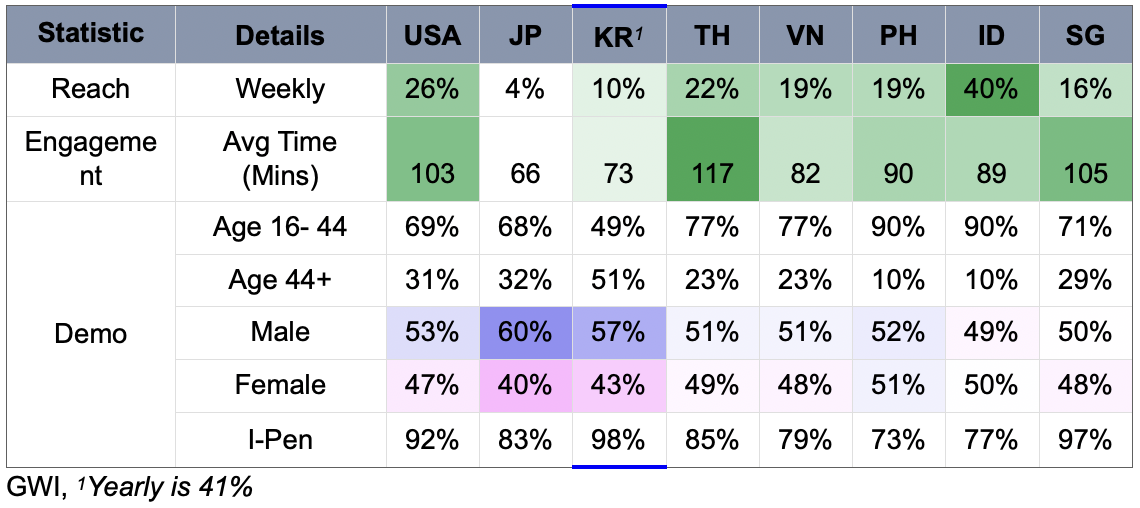
You’ll notice 3 things:
- There are more male listeners (57%)
- There are almost equal proportion of younger (<44) and older listeners (>44)
- Podcasts consumption is not popular in Korea -- 2nd lowest weekly reach, half that of the USA -- For those who listen, they still listen the 2nd least duration in the region
To the wisest in the industry, they would find this data unbelievable. For a period in time South Korea was hailed as a possible podcast capital of the world rivalling the United States. And why not? The infrastructure for South Korea is fertile for podcasts, the country is a robust tech centre with both high and fast internet speeds. Listener commutes in Seoul are long, and creators can have access to recording studios within Seoul.
GWI data is not perfect: and we believe the truth likely lies somewhere in between - a little higher than what GWI reports but still unlikely to be that of the United states. It also means directionally we can accept their position within the 8 countries listed above as likely to be correct.
The question then is why did people believe South Korea would become a podcast heavy nation? And why is there a disconnect from what we thought vs what we know now.
To make a good guess, we must walk down memory lane together, starting in 2011 - a time before America had the Serial podcast boom (2014) and when South Korea was on edge.
The rise of South Korea’s Podcast Industry
(citations at the end)
Lee Myung-Bak, the 17th president of Korea, had been in office since 25th February 2008. Lee was an incredible man, a man of many firsts - he was supposingly part of Korea’s first overseas construction project, the first CEO at age 35 for Hyundai no less, and the first leader with a pure business background - a symbol of South Korea’s economic boom.
On paper he seemed great, but the rumours were spreading, accusations of stock manipulation, nepotism, and embezzlement were being tossed around.
During that time media was tight, in fact suspiciously tight that Lee Myung-bak’s government was also accused of influencing broadcast media by appointing loyalists across key positions.
Times did not seem optimistic, but at least the Korean wave had begun - and a popular program titled “I am a Singer” began airing on March 6, 2011. It was a hit, with expert singers battling it out to win a coveted title as “the survivor”.
Far from the glitz & glamour of the TV studios sat 4 Koreans, (1) Kim Eo-Jun, (2) Jeong Bong-Joo, (3) Jinwoo Joo, and (4) Kim Yong-min, who were enthralled by the popularity of the program but also, they thought it would be funny if it was about politics. So it began that the 4 would pack themselves in a tight recording studio rented at Mapo-gu, or in Daehangno-gu where they would discuss the key controversies surrounding Lee Myung-Bak.
But producing a broadcast with 4 speakers can get messy, so they devised roles for each other that varied from comical to satirical, which produced a final product that wasn’t just about political insight - it was funny, raw, and seemed almost unscripted. They named it “Naneun Ggomsuda” or “I’m a Petty-Minded Creep” and dedicated the podcast to “His Highness” otherwise known as Lee Myung-Bak.
By the end of April, they had completed their first episode, and loaded it up onto iTunes - a white space that was relatively free of censorship.
The four podcasters had no idea they were about to create a Serial-like inflection, even before THE real Serial had launched.
By their 4th episode they took first place in the politics/news category for iTunes podcast charts, before staying on #1 for their remaining season. By November that year, each episode would generate over 2 million downloads, and the podcast would have featured in the New York Times and the Wall Street Journal.
In the start of 2012, the audience of the Naneun Ggomsuda was still sustaining which led Tag Story to establish Podbbang in March. Originally Podbbang was an audio only platform that offered popular TED lectures and on-demand segments from local radio broadcasts; but it evolved to become a hosting platform as well.
Then the next big podcast was released - titled “Red Bookstore (or cafe)”. It’s a 2 hour long podcast by film critic Lee Dong-Jin. Every 2 weeks he introduces a new book to the listeners and goes into in depth discussions of why it’s a great book. His success did not go unnoticed; very quickly one of the leading publishing houses “Munhakdongne” released their own in 2013, followed by the largest bookstore chain in South Korea in 2014. The “audiobook X review style” podcasts likely synergized with cafe culture that birthed a hipster book cafe craze which had even their largest coffee manufacturer (Maxim) creating their own.
Korean Podcasts like Naneun Ggomsuda and Red Bookstore were pivotal in setting the standard for Korean podcasts to be very long - easily past an hour of content per episode.
But it also spurred the public who became excited of the possibilities of what podcasting can bring, and became creators themselves - the future was bright for podcasts.
All around, success stories were being thrown - most famous of all was in 2015, the story of Song Eun-Yi and Kim Sook, 2 comedians who had stagnating popularity. Luckily, the duo had too much free time, and too few media requests that they decided to start a podcast loosely translated as “Keeping Secret”. The host will call their acquaintances or experts in each field to provide advice or address concerns received from netizens.
The format exploded - which led to the duo having their own show on radio, and TV appearances all around. The duo still attributes podcasting for the revival of their career.
By 2016, podcasting was accelerating further and Podbbang became the dominant player - which was why Tag Story, Podbbang’s parent company decided to rename themselves to Podbbang instead. Cumulatively Podbbang’s podcasts had an estimated 500,000 monthly active users, listening to over 8,000 active podcasts at that time.
But just like how Serial made True Crime the dominant category in the States, for Korea, because of Naneun Ggomsuda’s success, over a quarter of podcasts were on politics, followed by education and comedy. Specifically to learn English, culture & books, talkshow comedy.
The vast amount of political podcasts is also a big reason why there are more men listening to podcasts than women in Korea - because men in South Korea are expected to have an opinion or certainty of worldly affairs. It’s a measure of how put together a male is. Today the topics are shifting more towards finance.
The increase in women listeners only came in when “Keeping Secret” was released, followed by “Two women live here/ Two women are talking”, and “Life gets smarter when you listen”.
But in 2016, political podcasts were all the rage which surprisingly came from the ground up, as new media publishers weren’t exactly pushing creators to milk the politics genre dry. In fact, Podbbang’s approach to podcasting is incredibly creator driven: they would often explain that the best content creators are those that are happiest, and the happiest would often create what they like - thinking that even rings true today.
Podbbang’s approach also created large variances within the genre, because creators who enjoyed producing about politics were encouraged to produce for a wide spectrum of target audience. It also helped that internet penetration was growing even amongst the older, which were already familiar with radio.
It’s also why podcasting in Korea has a sizable population of older folks listening.
2016 was a great year, and many might think - if we continue this trajectory, we’ll be the podcast capital of Asia.
The decline of South Korea’s Podcast Industry
It’s dark sometimes under the lamp, because podcasting was in fact going to lose steam in Korea for two main reasons: regulations and monetisation.
Pre-2016 discussions on Korean internet censorship were heating up, likely driven by the political instability but also from the media groups, or “chaebols”, that were under intense content restrictions. Chaebol’s are huge conglomerates that often own multiple businesses, eg Samsung or Hyundai. Traditional media companies had a lot of restrictions, and as such, their topics of discussions were also more muted.
As new media grew to match the talkability of old media, restraints were unavoidable. In 2015 the Korea Communications Standards Commission released a self-recommended guideline to pressure digital publishers and creators to take action independently. Then they quickly rolled out a fine that accompanies negligence on their guidelines.
While this was bubbling amongst internet video broadcasters such as Youtube, and Afreeca TV (Think Korea’s Youtube, but more scandalous) conversations were being held on what to do with podcasting. Nothing clear came out, and all that’s left was uncertainty.
For a medium that was known primarily for its stripped down and raw delivery of information - the haunting uncertainty of regulation had suddenly made podcasting seem less attractive as a career.
That and of course money. Podcasts in Korea never seemed to figure out how to make money creatively - which makes sense because politics isn’t exactly the most brand safe of topics. The wealthiest podcasters are those that were picked up by traditional media, and given a booth to air their thoughts legitimately. Unless you can hold enough events, you aren’t going to get it through brand deals, nor audience donations.
Post 2018, YouTube was also catching on - previously it was known more as a playground for teens and teenagers but quickly evolved to become legitimate. But best of all? It promised adsense, so creators pivoted. Some of the more famous ones were “Sampro TV” which now commands over 2 million followers. Just like how TV consumed radio’s attention, so did Youtube to podcasting in Korea. During this period many things were also right for Youtube, a shift away from grinding at work and YOLO culture was in vogue. That meant that pursuing the “recklessness” of a lifestyle creator, or dedicating time away from work to watch pointless videos became more accepted, of course within the context in Asia.
And so podcasting seemed to be relegated as a hyper-niche medium, which experienced its first resurgence during covid. During this period all media boats were rising, and podcasts were simply another means for a creator to distribute. But come 2022, something incredible would happen - it is the new wave of Gen Z culture that gave birth to 갓생 - the “God Life”, a phenomenon that might just benefit podcasting.
South Korea’s Present Day
While we discussed the history of Korea’s podcast in-depth, we did miss out some undercurrents that were leading to the “God Life”.
While Korea is a relatively prosperous country it is common consensus amongst the youth that their generation is stricken with challenges. Youth unemployment rate is high, not because of a lack of education - but a lack of available jobs that suit their qualifications.
But in early 2020 the crypto-craze hit South Korea, a nation which already has a robust gaming industry, thus were comfortable with electronic micropayments. In fact Koreans have been spending money online as far back as 2002, on Sayclub.com - a popular virtual community (back then) where people pay to dress up their avatars.
It’s also why Podbbang recorded a rise in economic content surrounding finance, real estate, economy and tokens during 2019 to 2021. Listeners of economic content were more focused on the content itself, which allowed lo-fi productions to be equally well received as hi-fi - a perfect situation for entry level podcasters.
But more importantly, cryptocurrency showed young people that all was not lost in their hierarchical society, a moment that created some semblance of hope as fellow internet youths revealed their portfolio values. It’s also why finance became a more trending topic amongst youth as opposed to merely politics.
The crypto-craze arguably seeded hope, and hope is important, because the mindset radically shifts from surviving to thriving…yet the future is still unknown. To create a feeling of certainty, influencers started focusing on achieving the little things, and celebrating what was within their control; eg. waking up early, showing up to the gym, or drinking water regularly. It became common among peers to think that small achievements, when added up, can create great meaning in life.
En masse, this celebration coupled with mental wellness gave birth to the “God Life” habits which might just benefit podcasting. Because a negative element identified by the “God Life” is screen time, specifically social media (also known as SNS), and a positive element is to always continue learning.
In a generation where no time should be wasted rotting away, and reducing screen-time is viewed positively, podcasts as a form is advantageous.
It also helped that Podbbang maintained the pressure to positively grow podcasts - having launched a programmatic advertising platform in 2019. Admittedly Podbbang is hardly able to generate revenue like Youtube does which still remains a problem today; a problem that Podbbang is well aware of, and has developed its own originals. Over the years Podbbang’s strategy moved from driving high viewership to driving quality viewership and now carries a couple of interesting podcasts such as “True Crime”, but the top performing show is a talk show, the “Maebul Show”. Over the last 2 years they are in talks with AI speaker manufacturers, and car manufacturers to improve podcasting accessibility as well.
It’s worth noting that while these devices gradually increase audio consumption, they also tend to favour short clip-type content of around 5 to 10 minutes - a far cry from the usual 1 to 2 hour interactive podcast discussions.
As of latest figures Podbbang’s content business team leader and producer Yaeeun, Jung shared that they have 26,000 podcast channels with the majority of target audience falling within the 30 - 40 years old.
Regardless most pieces seem to be falling in place, although there are still some noticeable hurdles worth mentioning.
Firstly, a problem systemic in non-english speaking countries, is the lack of volume in local Korean podcast content. But the problem is more challenging in Korea because a population of 50 million is relatively smaller than most language speakers within the region (Malay, Mandarin, Japanese, Thai, Vietnamese, Tagalog)
Secondly, politics is a seasonal topic, and depends on the volatility of the governing bodies at the time. As a topic it’s not reliable across the years, nor even the year. Though not all podcasts in Korea are political, it’s worth knowing that about a quarter of South Korean listeners say politics and news is what they listen to on podcasts. Podcasts also attracted leftist leanings when they started, so much so that rightist discussions actually occur on a different platform - YouTube. But this behaviour is changing, especially when “Kim Eojoon’s News Factory” podcast (a left wing host) was shut down in 2022, and relaunched on YouTube. Within just 3 months, he grew to over 1.2 million subscribers on Youtube.
Thirdly, Seoul which houses 20% of Korea’s population is generally viewed as hyper-modern. Driven by connectivity, and technology thought leadership, it almost seemed like podcasting is old, and dated. Although Gen Z’s draw towards “nostalgia” might rebrand podcasting into “new retro” just like how baggy pants are in vogue.
And, Korea is naturally drawn to visual aesthetics. I mean, it’s the land of the 10-step korean routine, 14 hour k-pop practice, and casual dancing which means that any media without visual appeal naturally loses more viewership.
So what should we launch?
As always, it’s impossible to predict what would be the next category driver in Korea, but as always we’ll try.
The “God Life” phenomenon is revealing to us that Koreans can and do enjoy sticking to productive habits, some examples are Daily Schedules, Bodily Photo Updates, and Daily morning rituals (Miracle Morning). Unsurprisingly a rising category within Podbbang is the “Daily Life, Talk” category - where creators are comfortably sharing their personal lives. The most famous right now is of Kim Jjan Bu.
But we imagine not all listeners are treating the concept of “daily listening”/”Listen before talking” as a morning daily habit.
To drive the habit the show should have a daily content schedule but also provide useful information that strokes the intellectual ego or also known as “intellectual vanity” in korean.
Intellectual vanity in the western world is viewed as snobbism, but in the context of Korea is the acquiring of information to become perceived as “higher class”.
When discussed with Podbbang’s head of content business Yaeeun, Jung, majority of the top podcasts historically feed the intellectual vanity through asking questions that can be argued or to fill up insecurities that we might have.
Naneun Ggomsuda, the first political podcast, triggers different opinions through role playing, while Lee Dong-Jin, the host of Red Bookstore explains that consuming knowledge is to fill the void that is in your mind.
Thankfully these types of podcasts don’t require us to reinvent the wheel - in the west, and even within Singapore (where I’m from) daily podcasts that provide routine information are common.
Here’s 3 podcasts from around the world that give you a good idea:
- Daily News Style - “The Smart 7” which introduces listeners to the news around the world in 7 minutes.
- Daily comedic round table discussions - “The Daily Ketchup” which introduces Singaporean’s to everyday news with a side of comedy.
- Daily knowledge series - “Everything Everywhere Daily” which introduces listeners to general knowledge from around the world.
The choice of intellectual stimulus is tough, after all it shouldn’t be too niche that their friends cannot engage in conversation. Loosely speaking we see 7 broad-enough-topics to engage in: (1) Networth, (2) Career, (3) Body Aesthetics, (4) Body Health, (5) General Knowledge/ Worldliness, (6) Relationships and on occasion (7) Sense of identity (naturally this is not as strong, since collectivist culture in Korea is very strong).
By the way, there is still a whole universe of things that we wanted to share about Korea. For eg. have a browse around Korean TV dramas - the ones that really stand out tend to be very dark. To understand why we would have to take you through another history lesson spanning 129 episodes long that influenced TV within Korea…but it does make you wonder if it will influence Korea’s podcast appetite for the macabre. Unfortunately we couldn’t possibly cover the whole history, but do follow us (subscribe to Podnews or read my linkedin) as we may release these optimisations from time to time.
A favour
If you find this article helpful at all: I’ve a favour to ask.
Tell people about 1 Up Media’s new podcast Empires. It’s a podcast similar to Business Wars but set within Asia. As an example, we tell the monumental rise, failures, and victories that eventually gave birth to Tencent - the parent company of WeChat (Whatsapp of China with over a billion active users. Insane right?). Our audience are all business enthusiasts.
If you enjoyed the article we don’t ask for donations, just a quick shout out to Empires” is good enough!
But as always, no pressure. Even if you don’t help us, I’m happy to connect and talk to you if you’ve any more questions.
As usual, before we end things off, other interesting data worth showing to understand the landscape better:
Top listening platforms used amongst listeners of podcasts
Korea’s local presence seem to dominate the audio space.
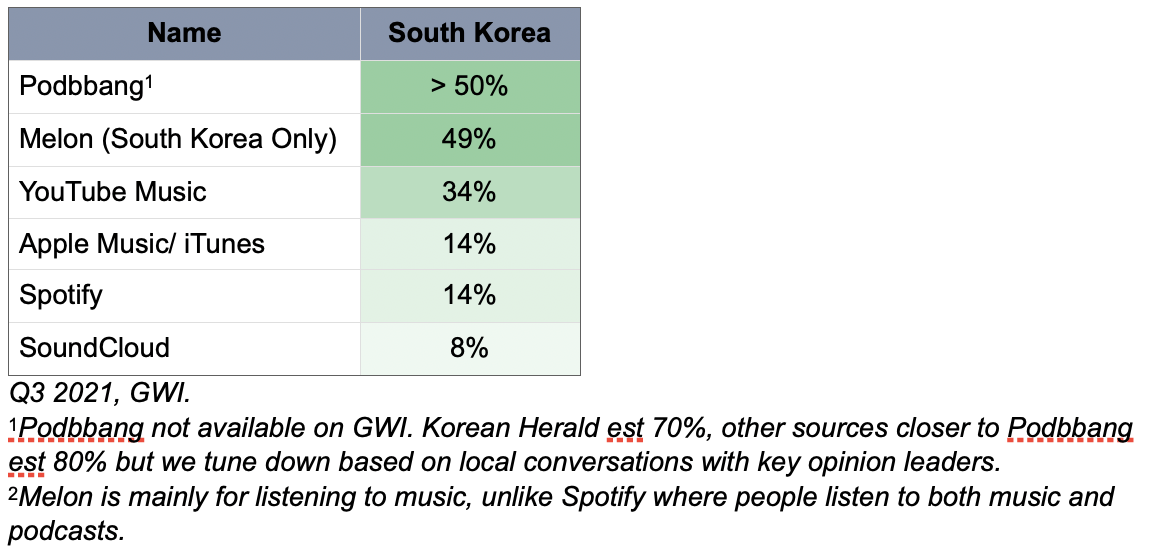
Koreans reason for getting into podcasts\
\ Knowledge acquisition (48%) > To learn passively (42%) > Freedom of consuming content whenever (38%) > Politics & News listening (22%) > Relaxation and sleep (20%), Entertainment (19%)
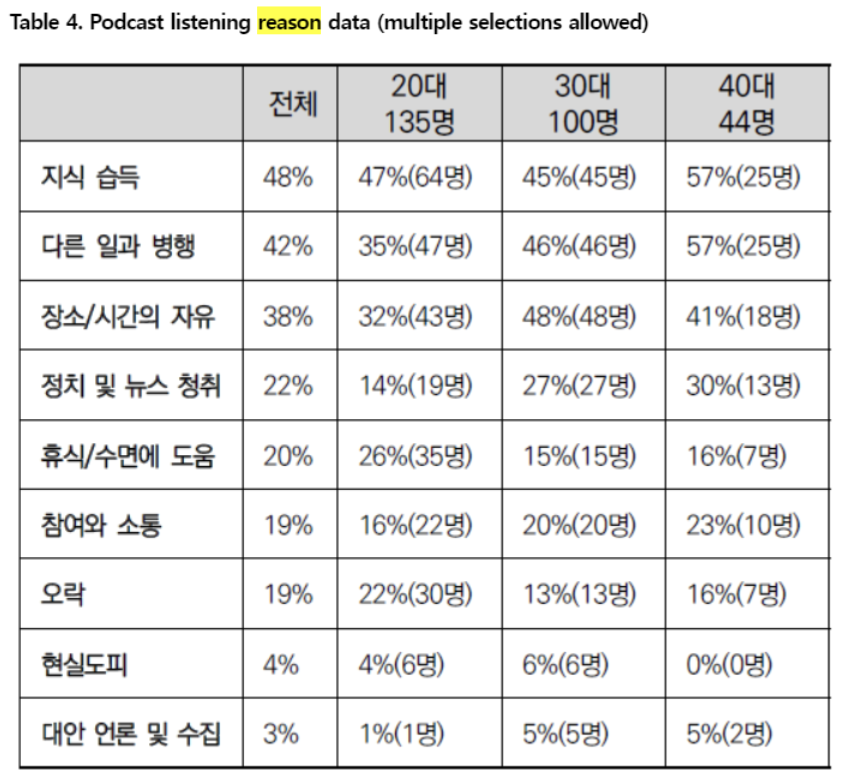
2022, The Journal of Korea Contents Association (College of Art and Design, Hongik University)
What are Koreans doing while listening:
Housework (38%) > Work/ Study (35%) > Listened as primary activity alone (30%). Surprisingly, driving/ working out and sleeping is at 19 - 20%.
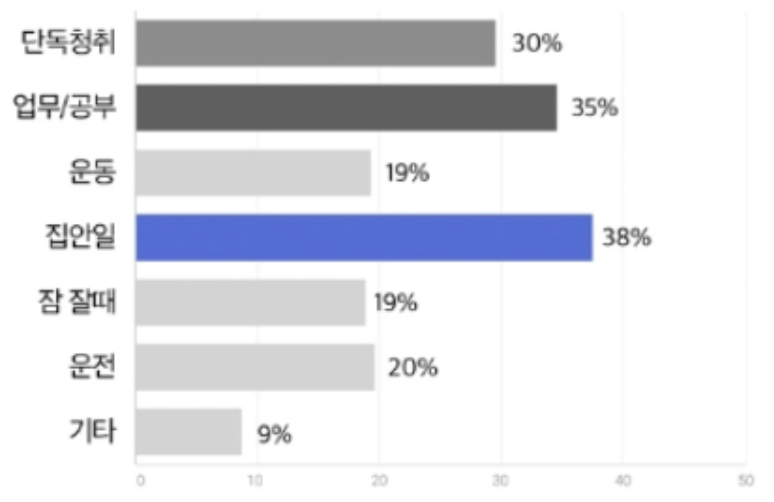
2022, The Journal of Korea Contents Association (College of Art and Design, Hongik University)
Koreans actually consume a broad range of topics - and consume them at different times of day.
For people who treat podcasts as the primary activity. (Primary activity can refer to the mindset, attitude & actual usage towards podcasting)
- In the morning: Liberal arts
- During lunch: Talk shows
- Late afternoon: Entertainment
- Sunset/evenings: Audiobooks
- Night: Entertainment
For people who treat podcasts as the secondary activity - tends to be broad-based & varied.
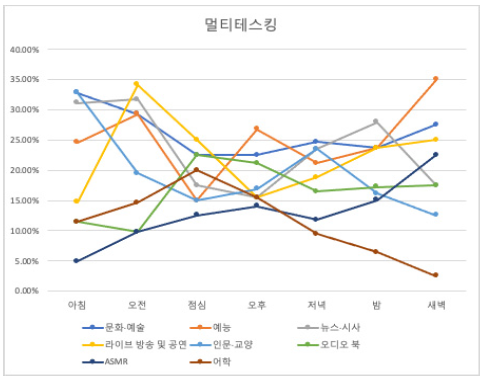
2022, The Journal of Korea Contents Association (College of Art and Design, Hongik University)
Korea Mobility Data
Measured as a % against the 5-week period (Jan 3–Feb 6, 2020):
Surprisingly Korea mobility seems a little lower than pre-covid levels, since transit station movement is still a little further from baseline. However, hiking has exploded - likely because Korea already has a strong hiking culture (don’t be surprise if a grandma climbs faster than you on Mount Halla!), and covid super charged hiking as a compensatory behaviour.
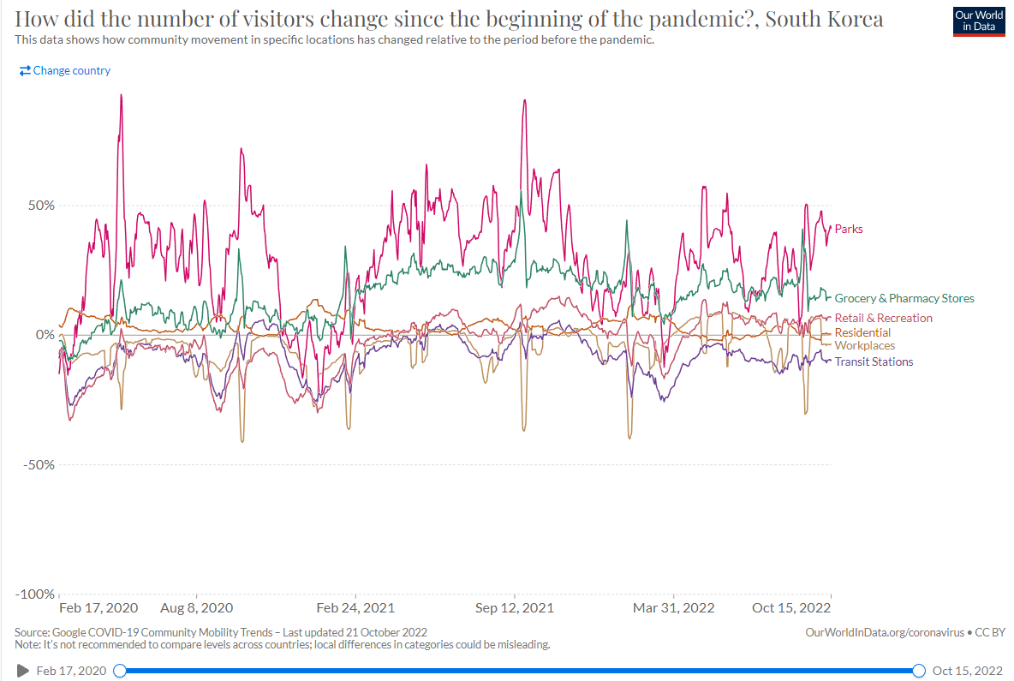
We hope the Korea deep-dive gives you some confidence to explore Korea as a market, and to be inspired to create more truly local content. If you need any help or want to have more discussions - do drop me a LinkedIn invite, I’m always excited for conversations!
Sources
Comment, the main bulk of the analysis is on the history of Korea’s podcasting, which brings together multiple data sources, and opinions. The links + GWI data is not used exclusively, rather the numbers are presented with inputs from the contributors - this enables us to triangulate a more accurate picture of the landscape’s data and history.
- Links:
https://dbr.donga.com/article/view/1202/article_no/10048/ac/magazine
https://www.ozy.com/the-new-and-the-next/how-south-korea-became-the-worlds-podcasting-capital/94692/
https://mediahub.seoul.go.kr/archives/2002369
https://blog.lareviewofbooks.org/the-korea-blog/korea-book-podcasts-draw-standing-room-crowds/
https://blog.naver.com/radiojye/222271487870
https://blog.naver.com/radiojye/222340333261 https://blog.naver.com/radiojye/222218180488
https://blog.naver.com/radiojye/222247457189
https://blog.naver.com/radiojye/222271487870
- Contributors
Yaeeun, Jung - Podbbang’s Content business team leader and Producer. Podbbang is Korea’s number 1 hosting platform and content publisher for podcasts. They produce top grossing programs that range from politics, education, business, economics and true crime.
Lee Sungkyu - The CEO & Co-Founder at Mediasphere, a Next Generation Publishing Platform. Mediasphere is building “Blue Dot” a revenue diversification platform builder that enables creators to quickly generate stable revenue.
Kunwoo Kim: 미디어자몽 대표이사 - CEO, MediaZamong Korea’s one-person media content business company, operating 5 content studios and cooperating with hundreds of teams in content production, nurturing thousands of one-person media content creators while simultaneously carrying out content education projects in Korea.
David Tizzard - David A Tizzard has a PhD in Korean Studies. He is an assistant professor at Seoul Women’s University and an adjunct professor at Hanyang University. He is the co-editor of The Future of the Korean Peninsula: Korea 2032 and Beyond (2022) as well as the author of various academic articles on Korean history and culture. He writes a weekly column in the Korea Times, hosts the Korea Deconstructed podcast (YT, Podcast, Twitter), and is a senior contributor to Asia Society Korea.

































































































